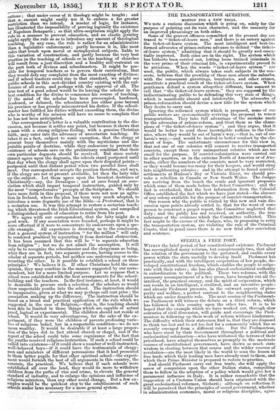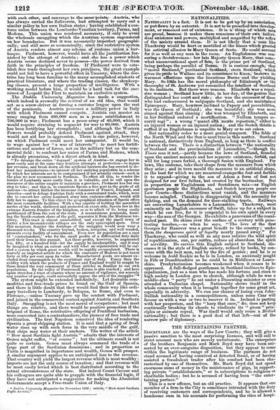SPEZZIA A FREE PORT.
WrrirrN the brief period of her constitutional existence Piedmont has accomplished many reforms, but conspicuously two, that alter the relation of the government to the governed, and enable every power within the state usefully to develop itself. Piedmont has- practically, and with the intelligent cooperation of her people, de- veloped constitutional freedom, which enables the people to coope- rate with their rulers; she has also placed ecclesiastical authority in subordination to the political. These two reforms, with the necessary accompaniment of a free press, have brought out all the intellect, the practical energy, and the spirit of cooperation, which can reside in an intelligent, a civilized, and an inventive people : and already Piedmont presents, in the outward aspects of pros- perity and welfare, a perfect contrast to the neighbouring states which are under despotic rule. The next session of the Piedmont- ese Parliament will witness the debate on a third reform, which has followed in this country upon the other two. It is to be hoped that the example which we have worked out, through slow centuries of civil dissension, will guide and encourage the Pied- montese in following up their work of reform without hinderance. The difficulty which their statesmen find is, that they are disposed to think too fast and to act too fast for a community which has so recently emerged from a different rule. But the Piedmontese, who have stood by their Government throughout a. political and ecclesiastical reformation—who have withstood the terrors of their priesthood, have adapted themselves so promptly to the moderate courses of constitutional government, have shown so much state wisdom in electing between that course and the wilder courses of revolution—are the most likely in the world to scan the lesson in free trade which their leading men have already read to them, and which their. Prime Minister is prepared to reduce to practice.
And should Piedmont carry out free trade, she will apply the screw of compulsion upon the other Italian states, compelling them to follow in the adoption of a policy which would give her a paramount influence in Italy. It is rather remarkable that the suggestion of a Customs Union should have originated with the great ecclesiastical reformer,. Gioberti ; although on reflection it will be perceived that the principles of sound government, whether in administration economies, moral or religious discipline, agree with each other, and converge to the same points.- Austria, who has always envied the Zollverein, had attempted to carry out a eireileV policy in her own Italian states ; having established a cus- toms union between the Lombardo-Venetian territory, Parma, and Modena. This union was rendered necessary, if only to avoid the wholesale smuggling which the Austrian system engendered on her boundaries. But it was necessarily imperfect geographi- cally, and still more so economically, since the restrictive system of Austria renders almost any scheine of customs union a bur- lesque. Piedmont, however, would have all the justification fur- nished by the attempt of Austria ; and she has a power which Austria seems destined never to possess--the power derived from faith in the principles of freedom. If Piedmont were to esta- blish free trade throughout her own, provinces, the great example -could not fail to have a powerful effect in Tuscany, where the doe, trine has long been familiar to the many accomplished students of practical literature, and where the trading classes, the shopkeep- ing classes, present a large proportion of intelligence. With a working model before him, it would be a hard task •for the eue cessoruf Leopold the First to maintain an exclusive system. The Dublin University Magazine has made a suggestion, which indeed is avowedly the revival of an old idea, that would -act as a screw-driver in forcing a customs 'league upon the rest of the peninsula. Austria possesses a military power in Italy with which Piedmont cannot compete. , Austria can muster an army ringing from 480,000 men as k peace establishment to 700,000 in war; Piedmont has a peace army of 40,000, which it would require straining to augment for war to 80,000. Austria has been fortifying her strongholds ; and although the Western Powers would probably. defend Piedmont against attack, they would not aid her in aggression. There is one policy, however, on which Piedmont could meet her antagonist. It would be, to wage against her " a war of interests •' ; to meet her fortifi- cations and muster of forces, not on the military but on the com- mercial field ; to confront her union of Parma and Modena, which is already precarious with a direct attack in kind. "To derange the entire doganal ' system of Austria—te engage her in most costly and at the same time fruitless attempts at protection—to injure her revenue, and break down all the artificial barrienishe has erected to de- fend her manufactures—to interest all her outlying populatibn in a scheme by which her interests are to be compromised.if not actually ruined—such is the plan we now recommend to Sardinia. To effect all this, to render the tenure of Lombardy more costly than it is valuable, and 'to call upon the resources of the entire empire to maintain a province, Piedmont has but one step to take ; and this is, to constitute Spezia a free port tc4 the goods of all nations—to attract thither the immense commerce of France, England, and America—and to deluge Austrian Italy with a contraband trade, which, were she to convert her entire Lombard army into customs-officers, would still defy her to oppose. To this object the geographical situation-of Spezia offers the most remarkable facilities. With a bay capable of holding the assembled navies of the world, sheltered and protected on every aid', Spezia lies in the extreme Eastern frontier of the kingdom, so as to admit of its being easily partitioned off from the rest of the state. A mountainous peninsula, form- ing the South-eastern shore of the gulf, separates it from the Modenese ter- ritory. This tract is almost uninhabited, and except the small town of Lena a few inconsiderable villages are the only unoccupied spots. Over this mountain frontier the footsteps of the smuggler would soon wear a thousand tracks. The country beyond, broken, irregular, and well wooded, presents every facility of concealment. Even now its population are a race of contrabandieri,' who for the small profits of a differential duty daily peril their lives in this pursuit Let these profits, however, be augmented ten, fifty, or a hundred fold—let the supply be inexhaustible, and it may be imagined to what an extent and with what an organization will be car- ried a system by which great wealth will be rapidly accumulated. There is scarcely an imported article for which the consumer of Modena is not taxed forty or fifty per cent upon its value. Manufactured goods are almost ex- cluded from consumption by the exorbitant rate of duty. Fancy then the avidity with which the products of France and England would be sought by those denied the very commonest of those articles so familiar to our own populations. By the valley of Pontremoll Parma is atio reached ; and here again stretches a tract of country where no amount of vigilance, nor scarcely an number of people, could successfully oppose the arts of the smuggler."* The system might be extended indefinitely. Let desirable com- modities and free-trade prices be found on the Gulf of Spezzia, and there is little doubt that they would find their way like ordi- nary travellers to Lombardy, to Bologna, to Rome, and even to Florence,—unless Tuscany gave up the contest with Piedmont, and joined in the commercial contest against Austrikand Southern Italy. Smuggling is not the most moral of occupations; but most things are relative, and there would-be positive promotion if the brigand of Rome, the retributive offspring of Pontifical barbarism, were converted into a eontrabandiere, the pioneer of free trade and civilization. The first Napoleon conceived the idea of rendering Spezzia a great shipping station. It is said that :a spring of fresh water rises up with such force in the very •middle of the gulf, that ships may water at their anchors. The writer of the article " How must Sardinia fight Austria" admits that the interests of Genoa might suffer, "of course " ; but the ultimate result is not quite so certain. Genoa must always command the trade of a large part of the Sardinian dominions ; and in proportion as Turin is magnified in importance and wealth, Genoa will prosper. A pitni or argument applies to an anticipated loss to the revenue. That country will yield the largest revenue which is moat wealthy : imports are not the only source of taxation; and that revenue will be most easily levied which is best distributed according to the actual circumstences of the state. But indeed Count Cavour and his colleagues are quite able to grapple with the financial logic, if they have not anticipated a suggestion for making the Absolutist Governments accept a Free-trade Union of Italy.
• Dublin University Magazine for November 1858 ; article," How must Sardinia Fight Austria."



























 Previous page
Previous page